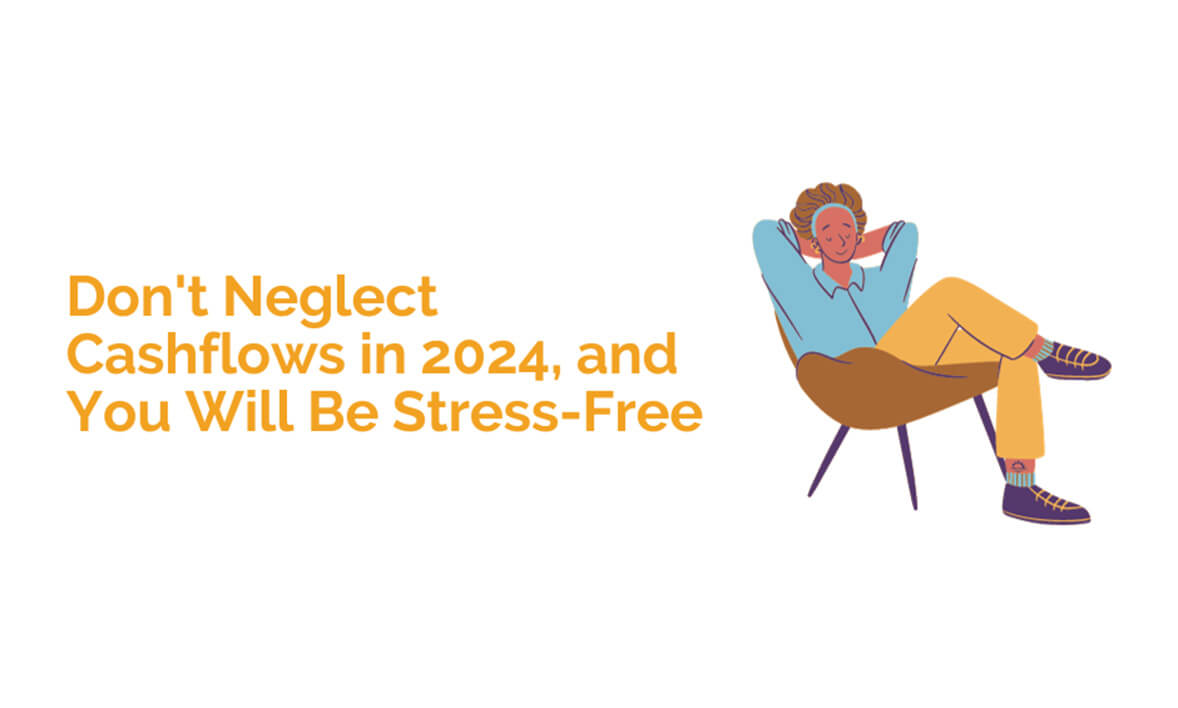Don't Neglect Cashflows in 2024, and You Will Be Stress-Free
What is Cash Flow Management
Cash flow management is a cornerstone of personal finance and is essential for ensuring financial stability and peace of mind. It involves understanding and overseeing the flow of your money – what you earn versus what you spend.
Effective cash flow management is not just about tracking daily expenses; it's about foreseeing and preparing for financial needs.
Stepping into 2024, with the economic game constantly changing, nailing cash flow management is more essential than ever.
Getting a grip on how money flows in and out is vital—it keeps financial stress at bay and sets you up for long-term security.
Understanding Cash Flows in Your Finances
Cash flow in personal finance represents the balance between your earnings and expenditures.
Think of this balance as your financial pulse—it's what lets you cover bills, stash away some cash for a rainy day, and grow your money through investments.
When you're in the green with your cash flow, it means you're not overspending and can save some money for plans or unexpected needs. On the flip side, if you're seeing more money going out than coming in, that's a red flag—it means you might be heading into some financial trouble, and it's time to take swift action to turn things around.
Understanding your cash flow is the first step towards achieving a stress-free financial lifestyle in 2024.
The Basics of Cash Flow
Cash flow, simply put, is the net amount of cash being transferred in and out of your personal finances.
It's a fundamental concept in financial planning, representing the difference between the money you receive (such as salaries, interest income, and dividends) and the money you spend (like bills, rent, or groceries).
Grasping how cash flow works is vital—it lets you juggle bills, save some dough, and put money into your future.
When you've got a handle on your cash flow, it's not just about the bucks coming in; it's also smartly managing your expenses to keep your financial ship steady.
What’s the ideal cash flow position?
Net Cash Flow = Total Income - Total Expenses, aligned with a Family Budget.
Having a positive cash flow is the ideal scenario, where you end up with excess cash that can be allocated towards savings, investments, or paying off loans more quickly.
On the other hand, negative cash flow occurs when your expenditures exceed your income within a given period.
So, you're in the red—spending money faster than you're making them. In such cases, you might need to secure loans, either secured or unsecured, to cover the shortfall.
Neutral cash flow is a less common situation where your income and expenses are perfectly balanced.
In this case, what you earn is precisely what you spend across various categories, resulting in a break-even situation with neither surplus nor deficit in your cash flow.
Assessing Your Current Cash Flow
To effectively analyse and understand your current cash flow, start by tracking all sources of income and all expenses over a specific period, typically a month.
Start by jotting down what you earn, like your paycheque, side gigs, or any dividends, and then deduct every cost – that's the rent or mortgage, debt payments, food bills, nights out.
By tracking your cash flow, you'll spot whether you're in the green, pocketing more money than what's going out, or in the red, because your spending overshoots what's coming in. Regularly reviewing your cash flow gives the data you need to make smart money decisions now and plan for the future.
Strategies for Optimising Cash Flow in 2024
Budgeting for Better Cash Management
Creating an effective budget is essential for positive cash flow. Keeping tabs on what you earn and spend, drawing a line on your splurges, and ensuring the must-haves are paid off first is key to nailing your budget.
Think of a budget like your financial GPS—it keeps you on track, makes sure you've got enough cash for the must-haves, and lets you stash away dough for down the road.
Managing Expenses and Saving Wisely
Controlling expenses is vital for improving cash flow. Trimming the fat in your budget by ditching non-essential expenses, hunting for better deals, and resisting the urge to buy on a whim can shore up your financial health.
At the same time, work on growing your savings by consistently funnelling into a bank account, dabbling in safe investments, or earmarking a chunk of your paycheque for down the road.
Advanced Cash Flow Techniques
Diversifying Income Streams
Diversifying income sources is a strategic move to stabilise and enhance cash flow. Branching out into part-time ventures, investing in revenue-producing assets, or boosting your skillset for higher-salary roles can bolster your financial resilience.
Artificial Intelligence has made inroads into many aspects of our lives. Find out how it affects your career and upskill to enhance the longevity and success of your work life.
Multiple income streams can buffer against job loss or economic downturns.
Planning for Emergencies
Emergency funds are crucial in cash flow management.
An emergency fund serves as your financial shock absorber, shielding you from the sting of high-interest loans when unexpected costs or income hiccups hit.
Ideally, an emergency fund should cover several months of living expenses. The emergency funds should be in a savings account or a liquid mutual fund so that you can easily get funds when you need them.
Building a Stress-Free Financial Future
A comprehensive approach to cash flow management, combining effective budgeting, expense control, income diversification, and emergency planning, sets the foundation for a financially secure and stress-free future.
Understanding cash flow is important for your personal balance sheet and will aid you in better planning of your financial moves.

